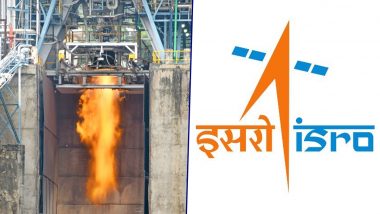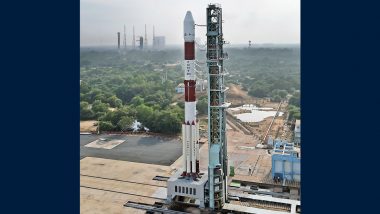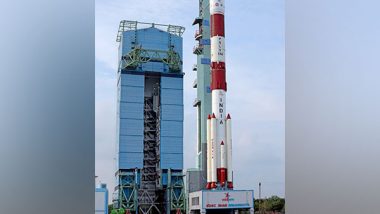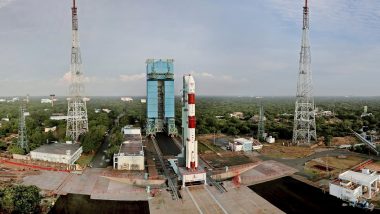Bengaluru, December 05: A satellite which will boost broadband connectivity to rural and inaccessible Gram Panchayats in the country, was launched on Wednesday. The Indian Space Research Organisation (ISRO) successfully launched the heaviest and most-advanced high throughput communication satellite GSAT-11 from the Spaceport in French Guiana.
The launch vehicle, Ariane 5 VA-246, lifted off from Kourou Launch Base at 2.07 am (IST) carrying India's GSAT-11 and South Korea's GEO-KOMPSAT-2A satellites. Ariane 5 is one of three launch vehicles operated by Arianespace along with Soyuz and Vega. ISRO Successfully Launches India’s Heaviest and Most Powerful Satellite GSAT-11 From French Guiana; All You Need to Know.
After a 30-minute flight, the GSAT-11 detached from the Ariane 5 upper stage in an elliptical Geosynchronous Transfer Orbit, achieving an orbit very close to the intended one, said the ISRO which is headquartered in Bengaluru.
..3
..2
..1
And the countdown begins for the launch of @isro's heaviest satellite🚀#GSAT11 onboard #Ariane5 VA246 from French Guiana at 02:07 IST tomorrow.
Will play a vital role in providing broadband services across the country. pic.twitter.com/aAclImRduq
— PIB India (@PIB_India) December 4, 2018
Prime Minister Narendra Modi hailed the launch as a major milestone for the country's space programme, saying it will transform the lives of crores of Indians by connecting remote areas. He congratulated the ISRO scientists and encouraged them to keep innovating and setting high standards of success.
A major milestone for our space programme, which will transform the lives of crores of Indians by connecting remote areas!
Congrats to @isro for the successful launch of GSAT-11, which is the heaviest, largest and most-advanced high throughput communication satellite of India.
— Narendra Modi (@narendramodi) December 5, 2018
"A major milestone for our space programme, which will transform the lives of crores of Indians by connecting remote areas! Congrats to @isro for the successful launch of GSAT-11, which is the heaviest, largest and most-advanced high throughput communication satellite of India," he tweeted.
In another tweet, the Prime Minister said: "India is proud of our scientists, who keep innovating and setting high standards of scale, achievements and success. Their remarkable work inspires every Indian. @isro."
The 5854-kilogram satellite will provide high data rate connectivity to users in the Indian mainland and islands through 32 user beams in the Ku-band and 8 hub beams in the Ka-band.
"GSAT-11 will boost the broadband connectivity to rural and inaccessible gram panchayats in the country coming under the Bharat Net Project, which is part of the Digital India Programme. Today's successful mission has boosted the confidence of the entire team," said ISRO chief Dr K Sivan.
The GSAT-11 will act as a forerunner to all future high throughput communication satellites, he added. Post-separation, ISRO's Master Control Facility in Karnataka's Hassan took over command and control of GSAT-11 and found its health parameters to be normal.
The scientists will undertake phase-wise orbit-raising manoeuvres in the following days to place the satellite in the Geostationary Orbit (36,000 kilometers above the equator) using its onboard propulsion systems. The GSAT-11 will be positioned at 74-degree east longitude in the geostationary orbit.
Thereafter, the two solar arrays and four antenna reflectors of the GSAT-11 will be deployed into orbit. The satellite will be operational after the successful completion of all in-orbit tests.













 Quickly
Quickly




















